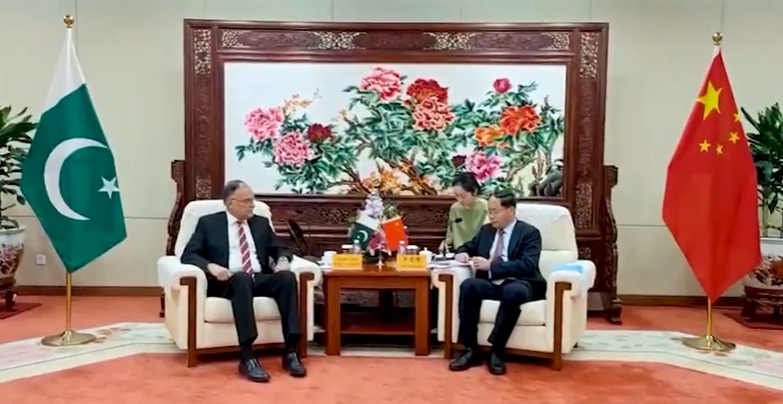From Our Correspondent
BEIJING: Federal Minister for Planning, Development and Special Initiatives Professor Ahsan Iqbal on Monday met with Chairman of the China Atomic Energy Authority and China’s Space Agency Shan Zhongde.
“The meeting focused on aligning cooperation in nuclear energy and space research with broader national development goals,” a news release said. Ahsan Iqbal acknowledged that China Pakistan Economic Corridor (CPEC) has played a vital role in removing bottlenecks in Pakistan’s infrastructure and energy sectors.
He noted that collaboration between Pakistan and China in the nuclear energy sector continues to grow. The K-2, K-3, and C-5 nuclear power plants stand as shining examples of this strategic cooperation. Speaking on the impacts of climate change, the minister stressed the urgent need to adopt alternative energy sources.
He said climate change has compelled the world to explore alternative energy avenues to address vulnerabilities in food security, water, healthcare, agriculture, mineral resources and other key sectors of the economy.
He said that under the leadership and vision of Prime Minister Shehbaz Sharif, Pakistan’s space program has gained new momentum.
Highlighting the “Uraan Pakistan” initiative, he said that special focus was being given to advancing space sciences. Recently, he said, Pakistan successfully launched three satellites with China’s cooperation, adding “Pakistan is set to send its first astronaut to the Chinese space station in 2026.” Ahsan Iqbal also shared that Pakistan’s space agency, SUPARCO, has been tasked with launching a lunar mission by 2035.
He emphasized that Pakistan possessed a pool of highly skilled human resources at a relatively low cost, which China could benefit from by enhancing their capabilities through collaboration. He said Pakistan has established a Quantum Computing Center in response to emerging technological challenges.
He stressed the importance of strengthening research partnership and knowledge exchange between CAEC, SUPARCO, and the Pakistan Atomic Energy Commission, for the peaceful use of technology.
The minister noted that the government has initiated a national program to align science, technology, and engineering sectors with Pakistan’s development goals.
Under the Uraan Pakistan initiative, he said, the development of human resources and acquisition of advanced technologies remain a top priority to compete with rapid global innovations.
He emphasized the need to expand opportunities for young Pakistani scientists to receive higher education in space technology through Chinese exchange programs.
Chairman Shan Zhongde appreciated Ahsan Iqbal’s valuable contributions to the progress of CPEC.
He said that Pakistan and China enjoyed strong geo-strategic relations which have now evolved into deep-rooted economic cooperation. He affirmed that China was ready to extend full cooperation to Pakistan in the field of space research, adding both countries were committed to the peaceful use of nuclear energy.





